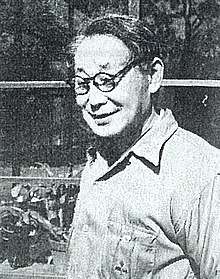Takeo Yamaguchi
Takeo Yamaguchi (山口長男, Yamaguchi Takeo, born November 23, 1902 in Seoul, Korea, died April 23, 1983 in Tokyo, Japan) was an avant-garde Japanese painter of monochrome Art Informel works.

Takeo Yamaguchi in 1964
About
Yamaguchi studied Western painting at the Tokyo Art School. Upon graduation in 1927, he moved to Paris to study European painting. He developed his mature style during the mid-1950s, with a focus on flatness.[1]
Yamaguchi's Yellow Eyes, painted in 1959, sold for US$948,500 at Sotheby's Contemporary Art Evening Sale in New York on May 18, 2017,[2] which set a record for the highest price paid for the artist's work.
Exhibitions
Group exhibitions
- 1955 - São Paulo Biennial[1]
- 1956 - Venice Biennale: Japan Pavilion
- 1958 - Guggenheim Museum: Guggenheim International Award exhibition,
- 1963 - São Paulo Biennial
- 1964 - Museum of Modern Art, New York: The New Japanese Painting and Sculpture
Solo exhibitions
- 1961 - Minami Gallery, Tokyo[1]
- 1963 - Nihonbashi Gallery, New York
- 1965 - Minami Gallery, Tokyo
- 1968 - Minami Gallery, Tokyo
- 1972 - Minami Gallery, Tokyo
- 1975 - Minami Gallery, Tokyo
Permanent collections
- Guggenheim Museum, New York[3]
- Metropolitan Museum of Modern Art, New York
- Brooklyn Museum, New York
- Menard Art Museum, Nagoya
- Shizuoka Prefectural Museum of Art
- Shimane Art Museum
- Museu de Arte Moderna, São Paulo
- National Museum of Modern Art, Tokyo
- Municipal Museum, Kagoshima
- Museum of Modern Art, Kamakura
gollark: No, it would play them to you throughout the day.
gollark: Repeatedly, until you acknowledge them.
gollark: You could set up scripts to read them out to you via TTS at random times.
gollark: You really should follow these things by RSS reader.
gollark: I can compress images nicely for thumbnails so it isn't really a huge issue. I'm mostly concerned about actually having good images.
References
- https://www.guggenheim.org/artwork/artist/Takeo-Yamaguchi Takeo Yamaguchi, Solomon R. Guggenheim Foundation
- https://www.artsy.net/article/artsy-editorial-110-million-basquiat-unseats-warhol-americas-expensive-artist-sothebys-sale Artsy.net
- http://japanesescreens.com/catalogue/modernpost-war/7356/ Gregg Baker Asian Art
This article is issued from Wikipedia. The text is licensed under Creative Commons - Attribution - Sharealike. Additional terms may apply for the media files.